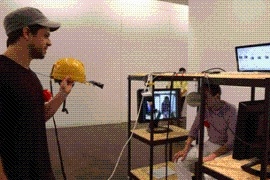Japanese Government (MEXT) Postgraduate Scholarships
2016/4/28


MEXT Alumni Personal Experiences
Dr William Hall (PhD Art) - Kyoto City University of Arts from April 2008 - March 2015
My introduction to the MEXT scholarship came from a chance meeting with an American student in Kyushu. At the time, I was in my second year of a fantastic JET Programme experience, and I knew that I wanted to stay in Japan longer so it was with wide-eyed enthusiasm that I listened to this American student telling me about the benefits of the scholarship. He had only positive things to say about studying in Japan with the support of MEXT. Being able to pursue my art studies further in Japan seemed like an amazing opportunity, and being able to do it without the crippling financial burden of fees and living costs sounded almost too good to be true. I began my application to enter the Masters course at Kyoto City University of Arts immediately.
The application procedure turned out to be one of the biggest challenges of the scholarship. There was a seemingly endless amount of documents that needed to be submitted: medical checks, graduation certificates, study proposals and essays, while at the same time I knew that the acceptance rates for the scholarship are very competitive and wondered if it may all be in vain. Because I was still on the JET Programme at the time of my application, when I finally did receive the news that I had been accepted for an interview at the Japanese Embassy in London, I was presented with the additional problem of having to fly back to the UK at short notice to attend. Today I have no regrets about scraping together the money and abruptly shuffling my schedule around in order to make that flight as the following 5 years as a Masters and PhD student in Kyoto was the most rewarding time I could possibly imagine.
For me, one of the best aspects of the MEXT scholarship is the top level Japanese language education that you will receive when you first arrive. Generally, you will be offered a 6-month intensive language course before you enter your university of choice as a full time student. I found the course to be well structured, with beginners, intermediate, and advanced classes all on offer. The classes not only help you get your essential Japanese skills in order, they also focus on cultural aspects of life in Japan with presentations and activities all done in Japanese. I thoroughly enjoyed the classes; the chance to learn about Japan in such depth along with other international students from all over the world was a great experience. The classes could be quite intense at times, I would usually be in the classroom from 9am until noon, Monday to Friday, which doesn’t sound like all that much in retrospect, but coupled with a heavy homework load and an active social life, it all added up to quite a busy schedule. Looking back, this experience was hugely beneficial in picking up the language, and I remember the classes very fondly. Not only were the students from diverse backgrounds in terms of nationalities, but also academic disciplines, and it really was a very rich environment for intercultural exchange. I am still in touch with many friends I made in those short 6 months.
At some Japanese universities, there are international offices staffed by English speakers who are there to assist you. Furthermore, due to the high numbers of international students coming through the university, they may well have accommodation on offer or, at the least, be able to give assistance in finding private apartments. My best advice for finding somewhere to live is to seek out whatever help you can from the office at your university, hopefully they can point you in the right direction in terms of finding English speaking estate agents. Finding an apartment and moving in Japan can actually be quite a painless procedure once you get used to the system, but if it is your first time doing so you may be frustrated by the various charges incurred. It can seem like you are being taken advantage of when you are pressed to pay two months rent in advance, a hefty deposit, “key money” (essentially a gift to the owner in the form of at least one month’s rent), and various additional insurance fees and commissions. However, it is good to remember that moving apartment can be a pain in any country and ultimately renting in Japan will probably work out slightly cheaper than in the UK.
I managed to find somewhere quite easily in one afternoon after being driven around the university neighborhood by an estate agent I had called in advance. It was a standard “one-room” apartment but it was cheap (around £250 per month at the time) and a quick 10-minute ride to the university, so I was satisfied. Generally you will sign a 2-year rental agreement when you move into an apartment in Japan. You can extend this for another 2-years should you choose, but this will require further renewal payments. Perhaps I went a little overboard in seeking the best place to live, but the process really does get easier the more practice you have, and how else would you pick up essential Japanese terms like “natural disaster insurance”?
Depending on how well your studies go, and your relationship with your supervisor, you may be encouraged to extend your time at the university. This will require another formal application for an extension of the MEXT scholarship, and a departmental exam and interview for the course itself. While this certainly depends on how the university and your own department are run, if your supervisor is keen for you to apply for the extension and if you have proven to the department that you are a suitable candidate to continue researching there.
There was a big change between academic life as a Masters student and a doctoral student. The weekly group seminars, critiques, and elective classes that I had enjoyed in the previous two years suddenly vanished, and I was very much left to my own devices to carry out my research. At the same time, the studio and research room that I was offered were much bigger and better equipped than what I was used to and I was even able to teach a weekly class for the Masters students. The first two years in the doctor course were great, with lots of exhibitions and other interesting opportunities being offered my way, but the final year was a fairly arduous slog in order to get the thesis finished on time and somehow convince my supervisors that I was worthy of a PhD. The effort was definitely worth it and I now look back on my time as a student in Japan not only with a sense of achievement, but also remembering the great times I had and the fantastic people I met along the way.
The application procedure turned out to be one of the biggest challenges of the scholarship. There was a seemingly endless amount of documents that needed to be submitted: medical checks, graduation certificates, study proposals and essays, while at the same time I knew that the acceptance rates for the scholarship are very competitive and wondered if it may all be in vain. Because I was still on the JET Programme at the time of my application, when I finally did receive the news that I had been accepted for an interview at the Japanese Embassy in London, I was presented with the additional problem of having to fly back to the UK at short notice to attend. Today I have no regrets about scraping together the money and abruptly shuffling my schedule around in order to make that flight as the following 5 years as a Masters and PhD student in Kyoto was the most rewarding time I could possibly imagine.
For me, one of the best aspects of the MEXT scholarship is the top level Japanese language education that you will receive when you first arrive. Generally, you will be offered a 6-month intensive language course before you enter your university of choice as a full time student. I found the course to be well structured, with beginners, intermediate, and advanced classes all on offer. The classes not only help you get your essential Japanese skills in order, they also focus on cultural aspects of life in Japan with presentations and activities all done in Japanese. I thoroughly enjoyed the classes; the chance to learn about Japan in such depth along with other international students from all over the world was a great experience. The classes could be quite intense at times, I would usually be in the classroom from 9am until noon, Monday to Friday, which doesn’t sound like all that much in retrospect, but coupled with a heavy homework load and an active social life, it all added up to quite a busy schedule. Looking back, this experience was hugely beneficial in picking up the language, and I remember the classes very fondly. Not only were the students from diverse backgrounds in terms of nationalities, but also academic disciplines, and it really was a very rich environment for intercultural exchange. I am still in touch with many friends I made in those short 6 months.
At some Japanese universities, there are international offices staffed by English speakers who are there to assist you. Furthermore, due to the high numbers of international students coming through the university, they may well have accommodation on offer or, at the least, be able to give assistance in finding private apartments. My best advice for finding somewhere to live is to seek out whatever help you can from the office at your university, hopefully they can point you in the right direction in terms of finding English speaking estate agents. Finding an apartment and moving in Japan can actually be quite a painless procedure once you get used to the system, but if it is your first time doing so you may be frustrated by the various charges incurred. It can seem like you are being taken advantage of when you are pressed to pay two months rent in advance, a hefty deposit, “key money” (essentially a gift to the owner in the form of at least one month’s rent), and various additional insurance fees and commissions. However, it is good to remember that moving apartment can be a pain in any country and ultimately renting in Japan will probably work out slightly cheaper than in the UK.
I managed to find somewhere quite easily in one afternoon after being driven around the university neighborhood by an estate agent I had called in advance. It was a standard “one-room” apartment but it was cheap (around £250 per month at the time) and a quick 10-minute ride to the university, so I was satisfied. Generally you will sign a 2-year rental agreement when you move into an apartment in Japan. You can extend this for another 2-years should you choose, but this will require further renewal payments. Perhaps I went a little overboard in seeking the best place to live, but the process really does get easier the more practice you have, and how else would you pick up essential Japanese terms like “natural disaster insurance”?
Depending on how well your studies go, and your relationship with your supervisor, you may be encouraged to extend your time at the university. This will require another formal application for an extension of the MEXT scholarship, and a departmental exam and interview for the course itself. While this certainly depends on how the university and your own department are run, if your supervisor is keen for you to apply for the extension and if you have proven to the department that you are a suitable candidate to continue researching there.
There was a big change between academic life as a Masters student and a doctoral student. The weekly group seminars, critiques, and elective classes that I had enjoyed in the previous two years suddenly vanished, and I was very much left to my own devices to carry out my research. At the same time, the studio and research room that I was offered were much bigger and better equipped than what I was used to and I was even able to teach a weekly class for the Masters students. The first two years in the doctor course were great, with lots of exhibitions and other interesting opportunities being offered my way, but the final year was a fairly arduous slog in order to get the thesis finished on time and somehow convince my supervisors that I was worthy of a PhD. The effort was definitely worth it and I now look back on my time as a student in Japan not only with a sense of achievement, but also remembering the great times I had and the fantastic people I met along the way.


